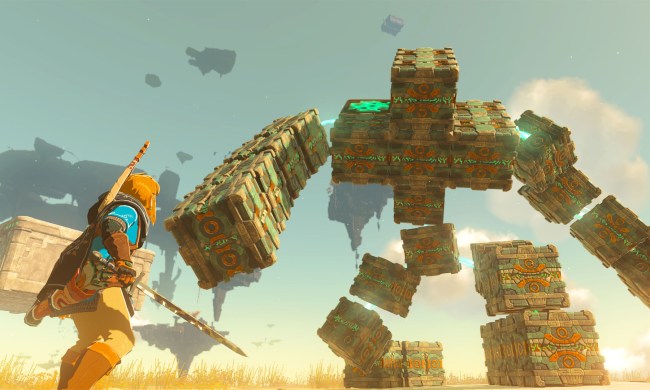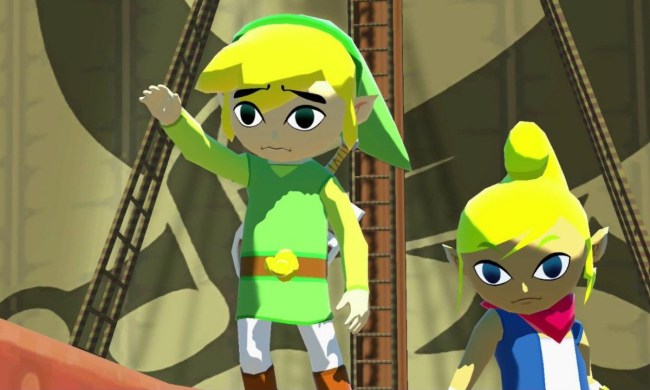The woman who voices Princess Zelda didn’t know she was auditioning for the role. Patricia Summersett had just moved to Los Angeles, and she used contacts built from years as a voice actress to land the audition for an unknown video game. The script was “bleached,” meaning it included no details about the story or character. She tried out for two generic parts: Princess and warrior woman.
For the princess, she was asked to do a voice “in the fantasy world, anything from mid-Atlantic realms of English, to the world of the U.K.,” Summersett told Digital Trends. The actor is from upper Michigan, but her take on Zelda is angelic, royal, and airy. She only learned what role she was trying to snag when she arrived for the first recording session and signed a non-disclosure agreement.
“It was the best thing I could ever hear, and the most terrifying,” Summersett said. “You just hope you do a good job and make it to the end. It could be huge, and I could fall flat on my face.”

The role would bring Summersett accolades and death threats, becoming her most prominent to date, but it was only the latest work in a voice acting career that spans decades. Summersett started her career in entertainment on the ice rink at the age of 6. From there, it was musical theater in Quebec in high school, and then a degree in theater. She learned that voice acting was a viable career pursuit and started searching job boards at her school for gigs. Her first job was a beer commercial for radio, but in the gaming industry, she started with indie titles.
“Most often it’s stealthy strong female warriors I audition for, having a low earthy voice,” she said. “But some other roles, let’s say, over the last two years, to name a sliver: Warrior animals, so many robots, excited children, queens, elves, princesses, singing llamas, scientists, Barbie parrots, evil blood-lusting monsters, desperate good-hearted mothers, pragmatic scientists, people who scream, and any and all strange characters one would find in numerous iterations of post-apocalyptic landscapes.”
To stand out from the crowd, she made semi-professional demos with a sound engineer, writing her own dialogue, which got her noticed by a gaming company. Her big “a-ha” moment came after many smaller gigs. A director was looking for someone to voice Angelina Jolie’s character in the video game adaptation of Beowulf.
She got the gig, and suddenly found herself on a new level — accepted into the Canadian union of film and TV. Summersett thought her take on Jolie sounded lusty, but the attention put her on the radar of larger projects. She also continued her education, earning a master’s degree in classical acting.

Summersett is serious about her craft. For Zelda, she dove into the universe, learning all she could about the character. It wasn’t her first time immersing her self in an established franchise. She voiced Hope Jensen in Assassin’s Creed Rogue, and was excited to work with well-known actors in the voice acting field. She also voiced another Assassin’s Creed character, Galina Voronina. Recently, the actor revealed that she voices a character Star Wars: Squadrons.
Playing Zelda allowed her to enter the top tier of actors in the field, but she still had to deal with issues that women too often face in entertainment. She dealt with condescending behavior and “the assumption that because I’m a woman, I can’t do certain things.” She also felt objectified at times, and other times felt like she was dealing with a toxic work environment, although she declined to name specific projects.
Still, she feels the industry is changing for the better. The last “three or four years” have seen advances in awareness, such as intimacy coordinators on sets, who make sure actors are protected during intimate scenes. According to the Screen Actors Guild – American Federation of Television and Radio Artists, an intimacy coordinator is “an advocate, a liaison between actors and production, and a movement coach and/or choreographer in regards to nudity and simulated sex and other intimate and hyper-exposed scenes.”
Interested in getting into voice acting? Summersett said it took her about seven years to establish herself in the field. The opportunities for women are growing, she said. But it’s important to know your value as an artist and not be afraid to push yourself. Working toward leadership and directing positions is also a good way to be able to chart one’s own path.
For Summersett, working in the videogame field has been a highlight in a career that includes music and TV acting. But it always comes down to the work.
“One of the challenges of being a voice actor,” she said, “is that you’re only as good as your last project. The hustling never stops.”



